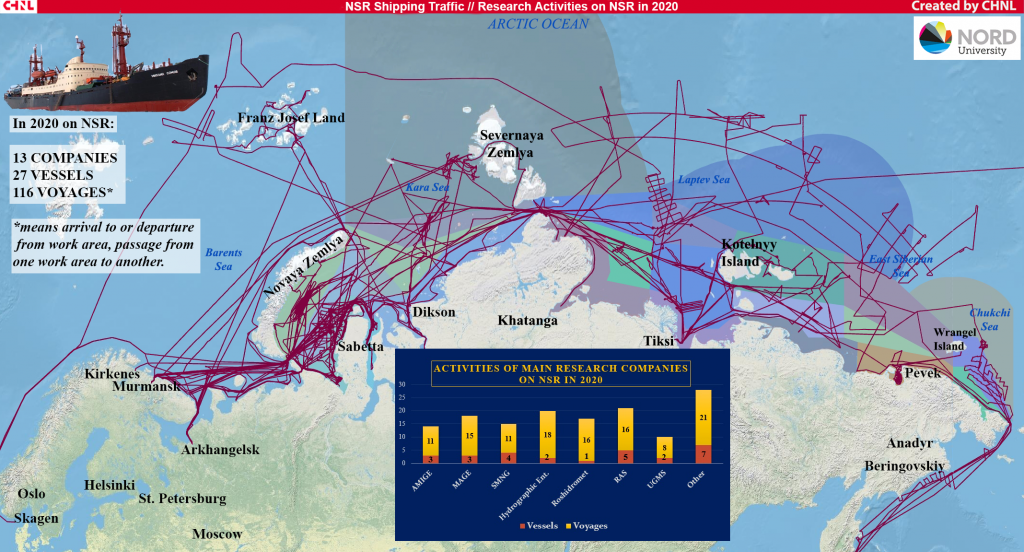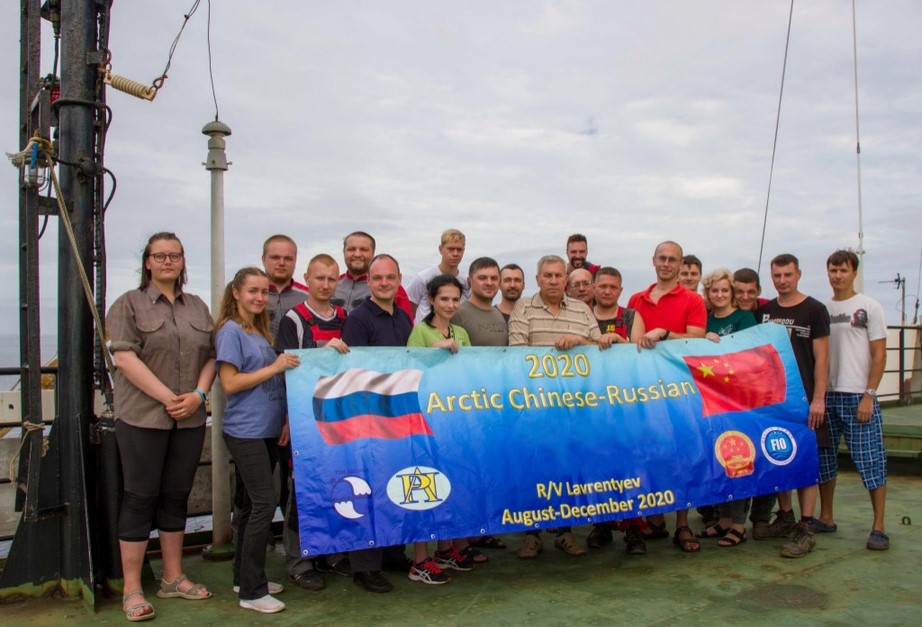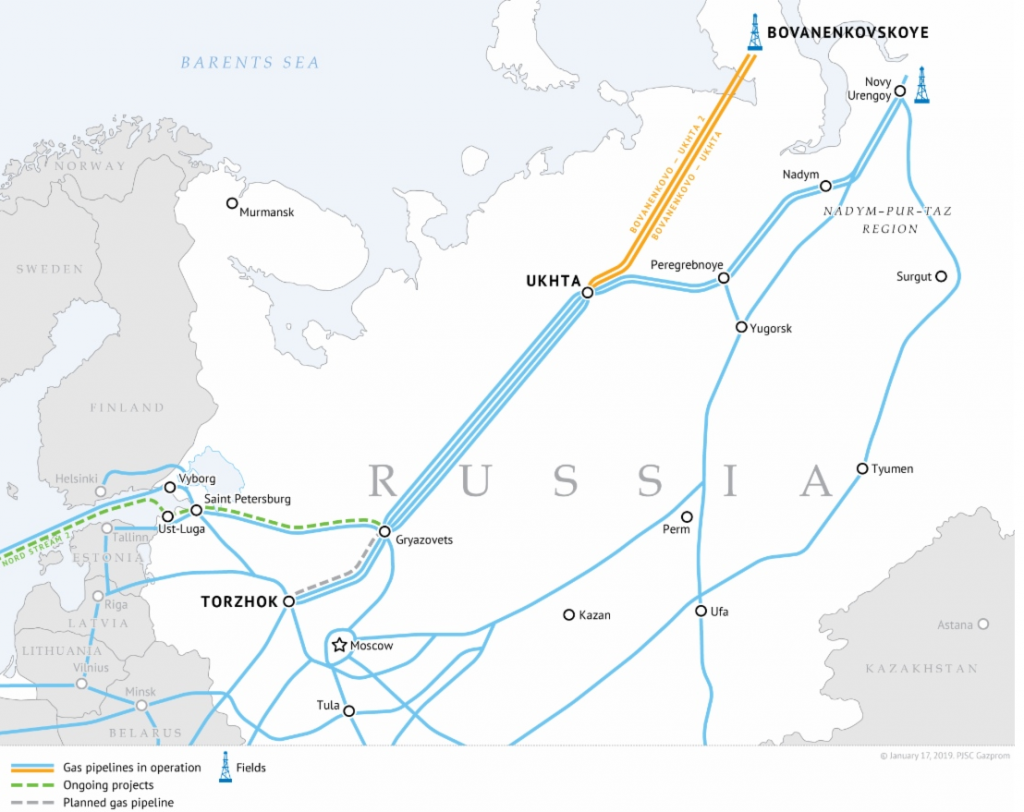NSR Shipping Traffic – Research Activities on NSR in 2020
Traditionally, with the beginning of the summer-autumn navigation period on the NSR active research activities started. The first, on June 30, to enter the waters of the NSR was “Geolog Nalivkin” vessel, ice class Arc 5, the last research vessel, “Grigoriy Mikheev”, with the same ice class Arc 5, left the NSR on November 10. In total, in 2020, 27 vessels and 13 companies were involved in research work. The geography of work covered all the seas of the Northern Sea Route and most of the Arctic. Here we have compiled a brief description of some of the research expeditions conducted on the NSR in 2020.
The vessel “Akademik Fedorov” for three months, from August 18 to November 12, conducted research in the Arctic Ocean. The work was carried out in heavy ice conditions in the presence of an ice cover of concentration from 8 to 10 points, the ice thickness reached 1.5–2 m. The icebreaker “50 let Pobedy” supported the vessel through the Arctic ice. The main objective of the studies was to obtain additional data on the seabed relief and the distribution of bottom sediments in order to prepare a digital seabed relief model. The full scope of work stipulated by the assignment, bathymetric studies in the areas of the Gakkel ridge, Lomonosov ridge, and the southern part of the Chukchi plateau, has been completed.
From August 27 to September 25, 2020, the 81st expeditionary voyage of the research vessel “Akademik Mstislav Keldysh” was carried out. The duration of the voyage was 30 days. The main purpose of the expedition was to assess the state of the marine environment, structure, productivity and functional parameters of the ecosystem of the Kara basin, including in the area of Novaya Zemlya bays. Assessment of the state of especially dangerous underwater objects as part of the largest dumping of radioactive waste in the bays of the eastern coast of Novaya Zemlya and the Novozemelskaya depression in the Kara Sea, identifying possible radioactivity leaks and areas of contamination.
The expedition of the vessel “Akademik Lavrentyev” was devoted to comprehensive research in the “lithosphere-hydrosphere-atmosphere” systems of the seas of the Arctic and Pacific basins at different time scales, providing a generalization of data on global and regional climate fluctuations and the creation of forecasts of the development of various environmental parameters necessary for economic development arctic and pacific regions. The expedition was organized by the Laboratory of Paleo-Oceanology of the Pacific Oceanological Institute of the Russian Academy of Sciences; researchers from five other laboratories (geochemistry of sedimentary processes, gas geochemistry, seismic research, informatics and ocean monitoring, marine ecotoxicology) also took part. From the international side, scientists from the First Institute of Oceanography of the Ministry of Natural Resources of China participated remotely. The difficult epidemiological situation in the world due to the spread of the COVID-19 virus did not allow organizing the personal participation of foreign colleagues in the expedition. At the same time, the work performed during the expedition was carried out taking into account the interests of the Chinese Institute. The areas of the planned work, the number of geological stations and samples of bottom sediments selected for joint study were agreed with the Chinese colleagues.
Photo: www.poi.dvo.ru
“Kapitan Voronin” vessel took part in a research expedition organized by “Arctic Research Center” (part of Rosneft Corporate Research and Design Complex). As part of the expedition, the vessel performed engineering and geophysical work in the waters of the north seas (Kara, Laptev, East Siberian). The main task of the project is to prepare for drilling stratigraphic wells in the Eastern Arctic. This is necessary, as explained in Rosneft, for core sampling and determination of the age, composition and conditions of formation of sedimentary cover of the studied shelf areas for understanding the geological structure and assessing the oil and gas potential of the region.
In accordance with the agreement between Arctic Scientific Center LLC (part of the corporate research and development complex of Rosneft Oil Company) and RosGeo JSC, “Bavenit” vessel carried out a complex of research works using shallow drilling technology (from 40 to 200 m) wells with full core samples collection, as well as geophysical studies of drilled wells in the northeastern part of the Kara Sea near the Severnaya Zemlya archipelago. Research is necessary to improve the reliability of the forecast of oil and gas prospects of sedimentary basins of different ages in the Arctic.
Two other vessels of JSC “RosGeo” – “Kimberlit” and “Kern” – within the framework of an agreement with LLC “Gazprom Proektirovanie” carried out geological surveys, as well as geophysical studies for the future construction of a third line of the Bovanenkovo-Ukhta gas pipeline in the Baydaratskaya Bay of the Kara Sea.
Photo: www.gazprom.com/projects/bovanenkovo-ukhta
The vessel “Mikhail Somov” delivered new teams of polar explorers, as well as fuel, food, medicines, equipment for aerological research, also construction materials to 16 polar stations of Roshydromet in the Kara Sea, on the Franz Josef Land and Novaya Zemlya archipelagoes. Also, specialists of the Northern UGMS updated the software of automatic meteorological complexes and stations, carried out maintenance and repair of communication devices and power equipment. On this voyage “Mikhail Somov” celebrated its 45th anniversary. The vessel was built in 1975 and during this time took part in more than 70 Antarctic and Arctic expeditions.



